Palak Paratha is a healthy mouth-watering unleavened Indian flatbread that is crispy on the outside and soft on the inside. It is made with spinach, whole wheat flour, chilies, carom seeds and is onion-garlic free. Serve this tasty spinach flatbread for breakfast with white butter, curd, or pickle.
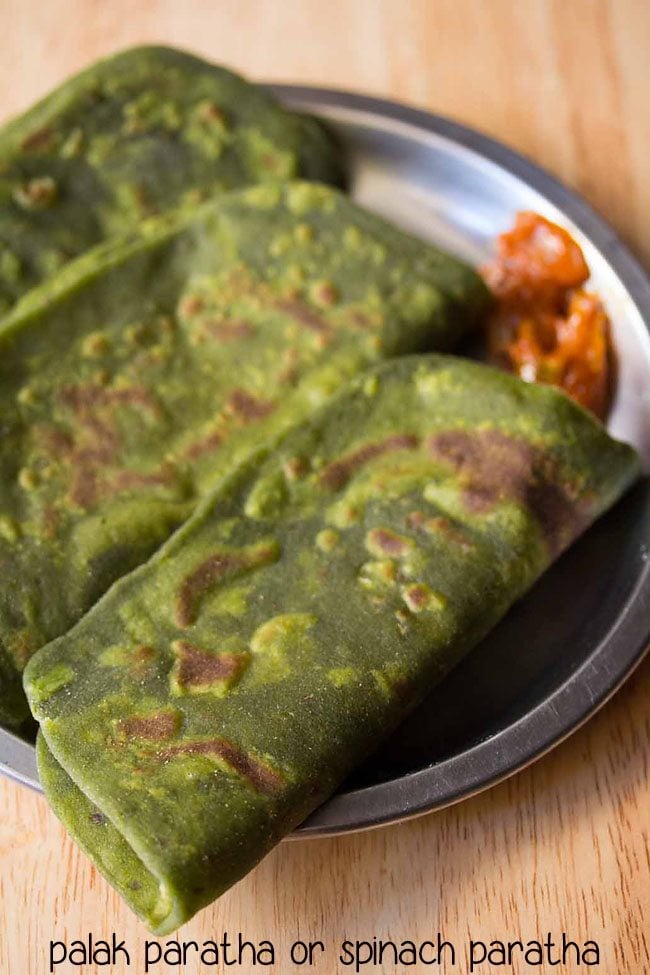
About Palak Paratha Recipe
Paratha is an unleavened Indian flatbread that has many variations with different stuffings. Parathas are usually named after their stuffings and palak means spinach in Hindi language so this dish is called “palak paratha”.
This spinach paratha has a beautiful vibrant green color and is a fantastic healthy alternative that includes healthy greens. It is especially good for children who do not like spinach.
Parathas are a popular breakfast choice in Northern India amongst Punjabi families. In Punjab, a lot of ghee is used to fry the parathas to make them crispy brown but you can also use oil to fry them as I do.
These parathas are a little crisp as we have roasted them with extra oil. For a less crispy paratha use less oil.
When making parathas, it’s better to follow the rolling and folding technique. While you roll the dough, apply oil or ghee and fold.
By doing this you get layered parathas with a soft texture inside. For this recipe, we made square-shaped parathas. You can also make triangular parathas as I did in this plain Paratha recipe.
Palak paratha can be eaten with lemon pickle, mango pickle, curd, or white butter and it is great during winters or monsoons with a cup of hot ginger tea.
Another great thing about parathas are that they keep really well and can be added to lunch boxes and taken on one-day journeys.
How to make Palak Paratha
Make Spinach Puree
1. Rinse 200 to 250 grams of spinach leaves very well with water and then drain them. If possible use organic spinach or grow your own spinach.
If buying spinach from outside make sure to soak them in a mix of water, vinegar and baking soda for 4 to 5 minutes. This removes some of the pesticides from the spinach leaves. Then rinse them again thoroughly with fresh water a few times. Drain all the water and set aside.
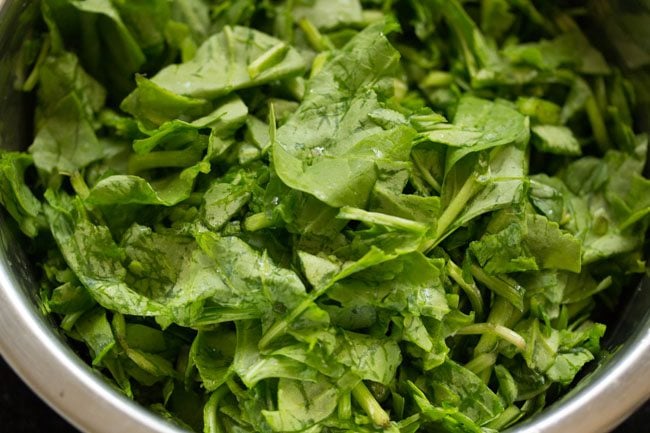
2. Heat some water in a pan until it boils. Remove the pan from the stove top and keep the pan on your work surface.
Add the spinach leaves and blanch them for 5 to 6 minutes. If you want you can strain and reserve some of the water that was used to blanch the spinach.
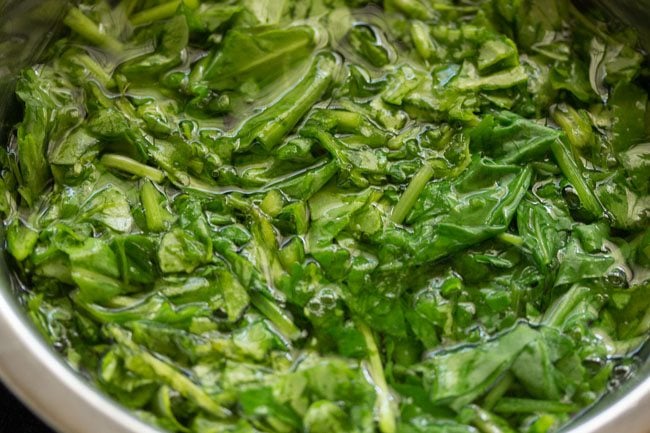
3. Add the blanched spinach leaves to the blender.
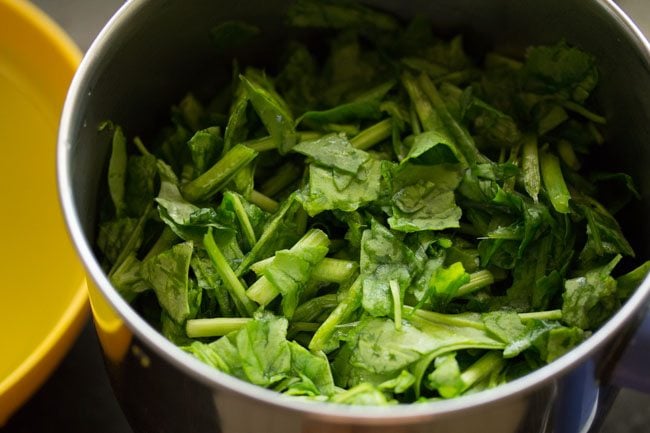
4. Make a smooth puree without adding any water.
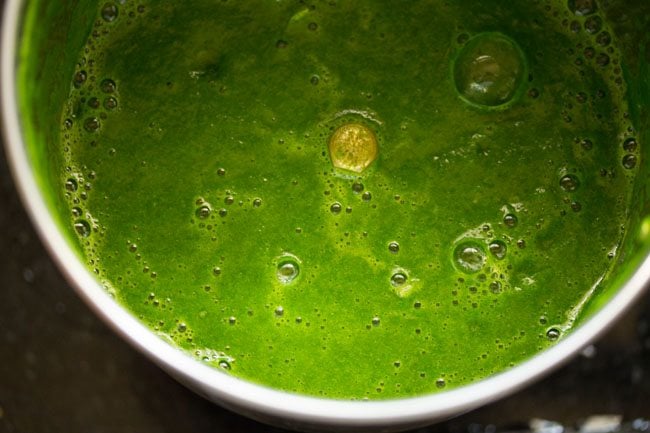
Knead Dough
5. Add 2 cups of whole wheat flour, ¼ teaspoon carom seeds (ajwain), 1-2 finely chopped green chilies (if using), 1 pinch of asafoetida (hing), and salt as required to a large bowl. Mix the ingredients together well.
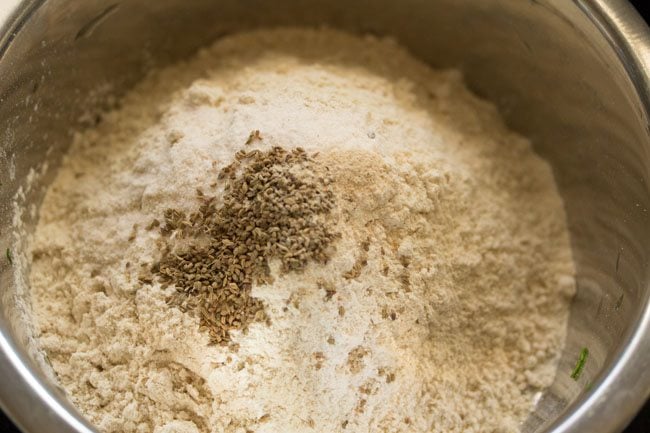
6. Then add the spinach puree and 2 teaspoon oil to the dry ingredients and mix well with a spoon.
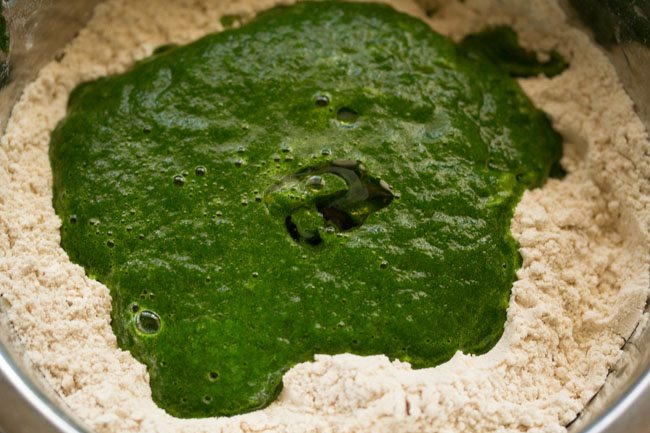
7. Add the required amount of the blanched stock or water. Add water in smaller portions and continue to knead.
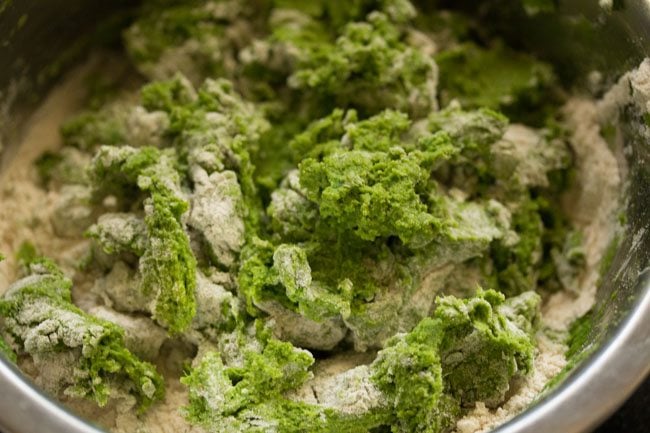
8. Knead into a smooth and soft dough.
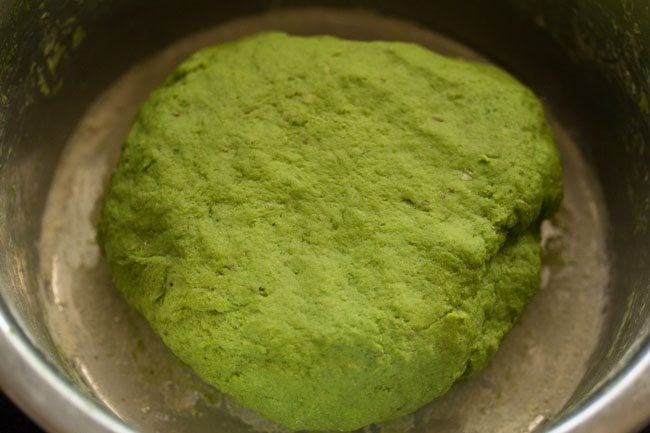
Assemble & Roll Paratha
9. Make a medium size ball from the dough.
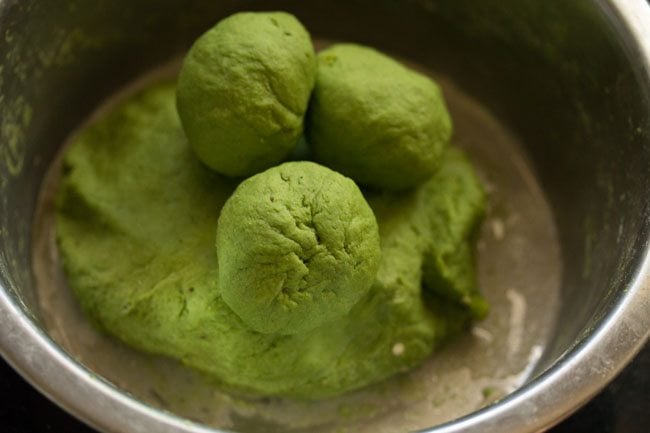
10. Roll the dough ball into a small circle and sprinkle some flour on top while rolling the dough ball.
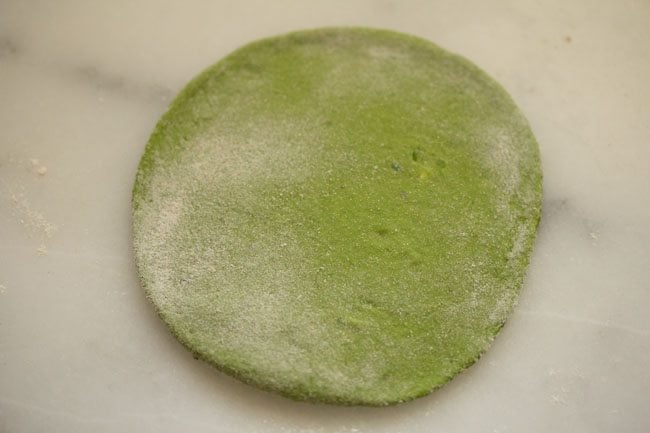
11. Spread some oil or ghee on the top of the rolled dough. I have used ghee.
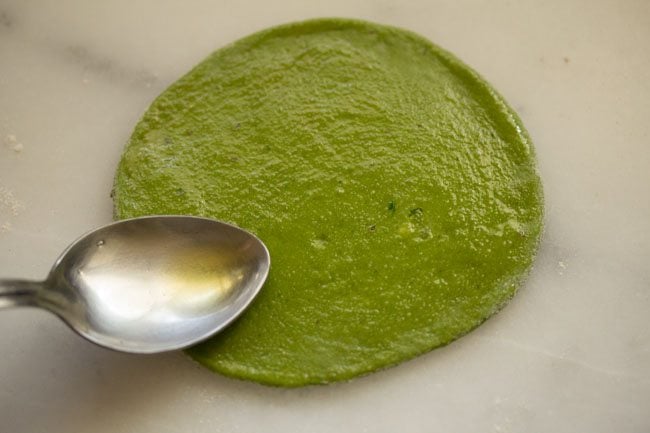
12. Fold from both sides.
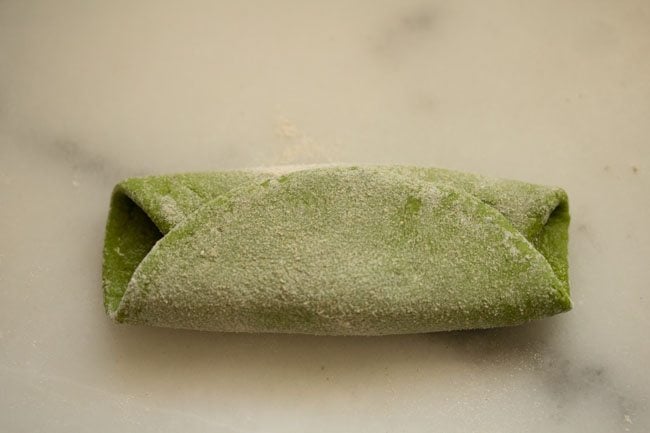
13. Apply the oil or ghee to the folded side.
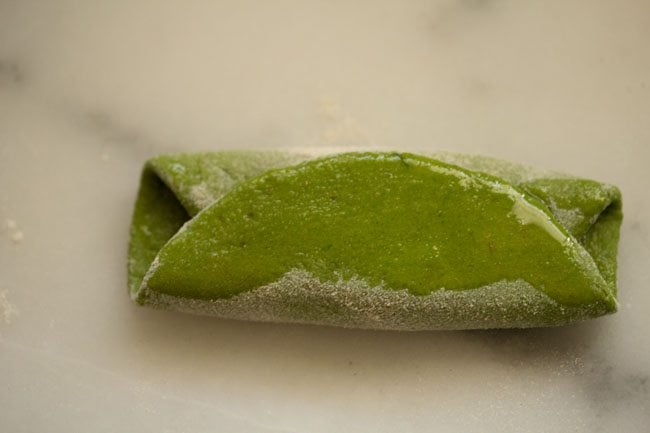
14. Fold again on the other sides to make a folded square shape.
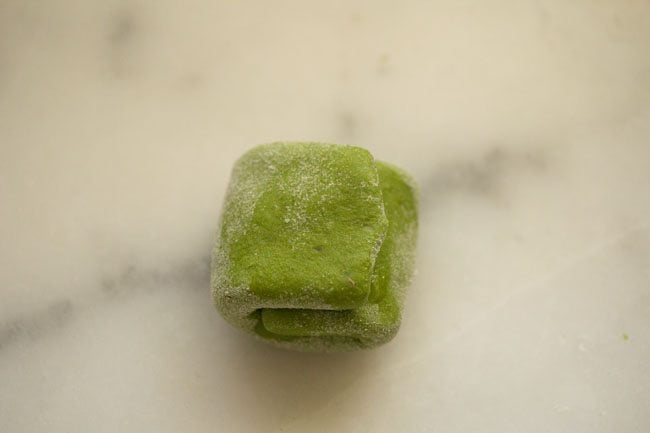
15. Roll into a medium-sized paratha.
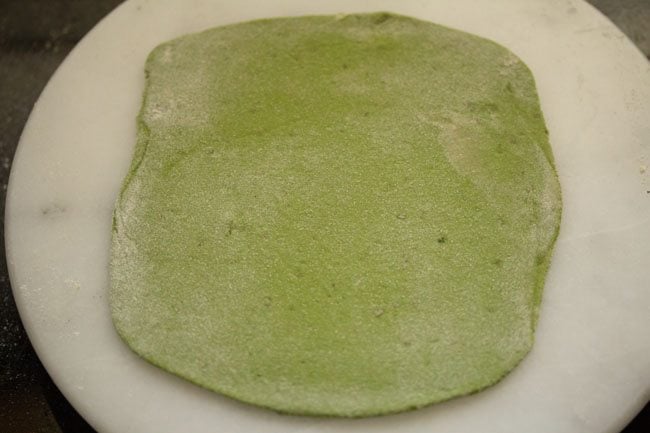
Make Palak Paratha
16. Place the palak ka paratha on a hot tava or skillet.
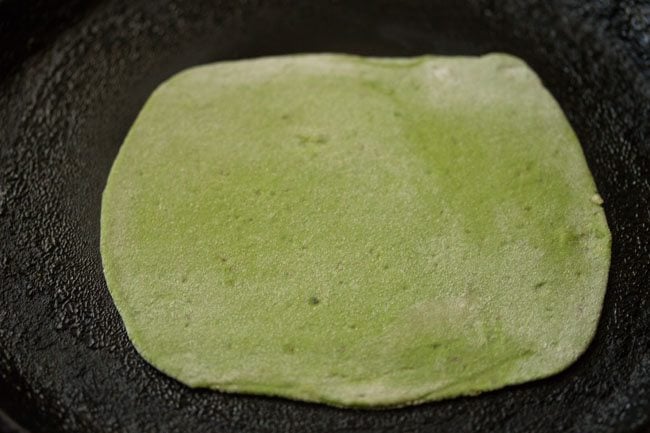
17. Once you see some air pockets on the paratha and its ¼ᵗʰ cooked, then flip it.
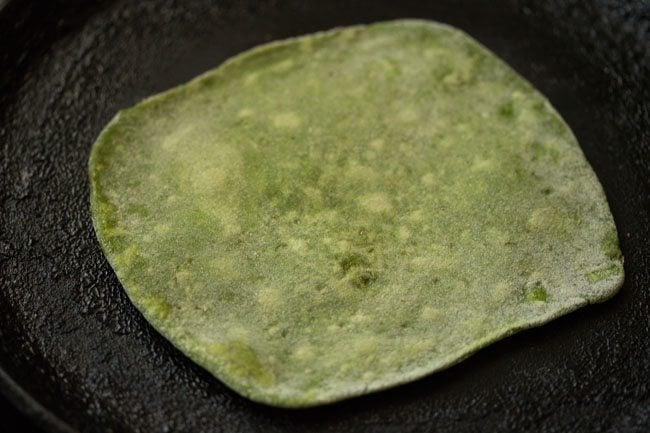
18. Drizzle some oil or ghee on the top side. I used ghee (clarified butter) to roast the paratha.
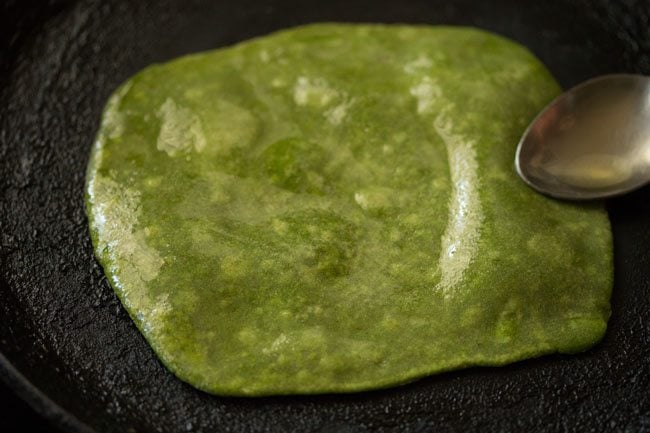
19. When the second side is half cooked then flip again.
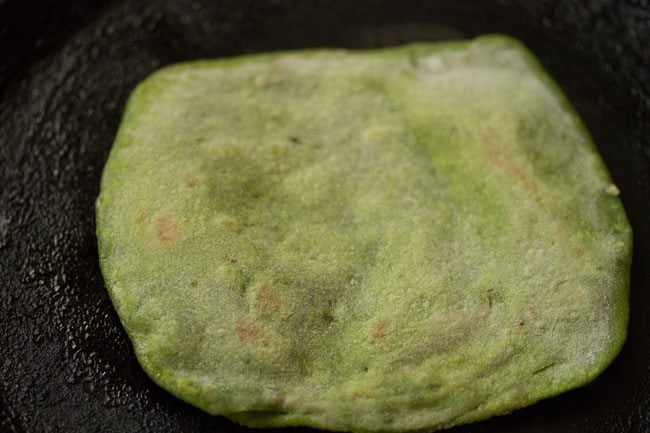
20. Again apply some oil or ghee on the top side (or second side).
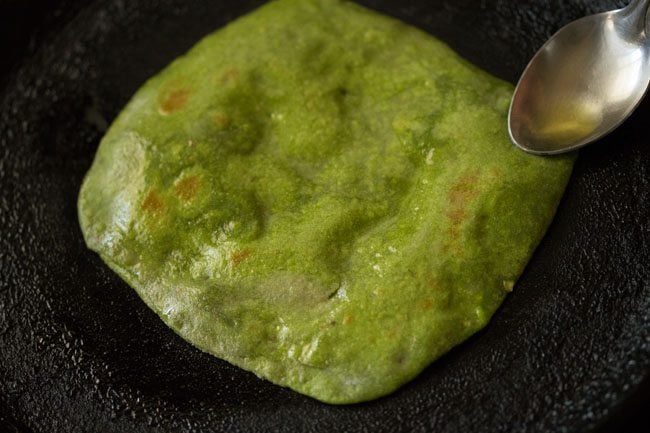
21. Press the paratha edges with the spatula or back of a spoon so that the paratha cooks evenly from all sides. You can flip a couple of times for even cooking.
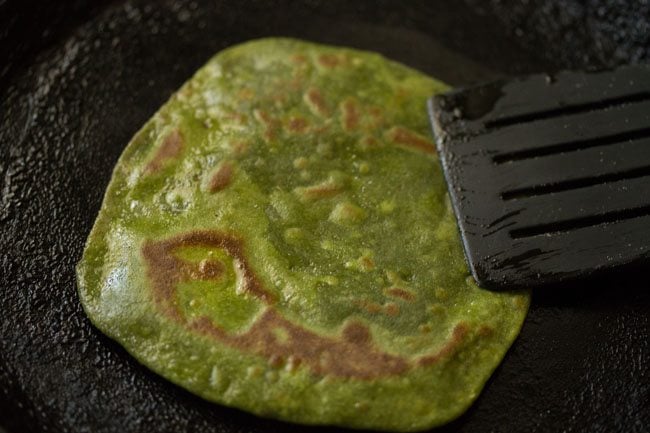
22. Cook palak paratha till they are crisp and brown on both sides. Make all the parathas this way. Before making the second paratha wipe the tava (skillet) with a kitchen napkin if there is any excess or extra whole wheat flour on it.
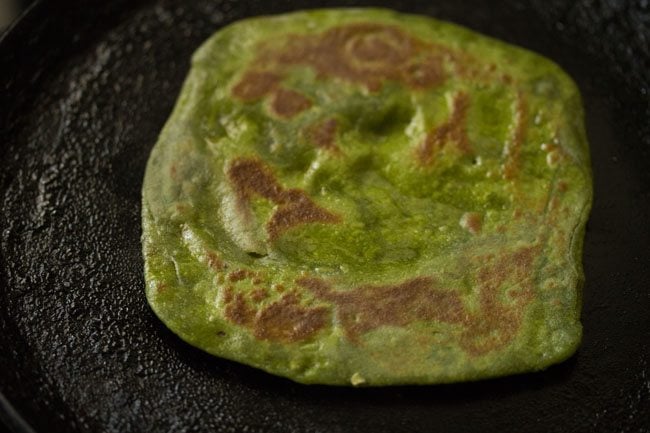
23. Serve the palak paratha hot with yogurt or pickle. We usually have them with Mango Pickle or lemon pickle. You can also stack the palak parathas in a roti basket or casserole and serve them warm later.
They can also be packed in lunch boxes or eaten for lunch, dinner, or as an evening snack with a cup of tea.
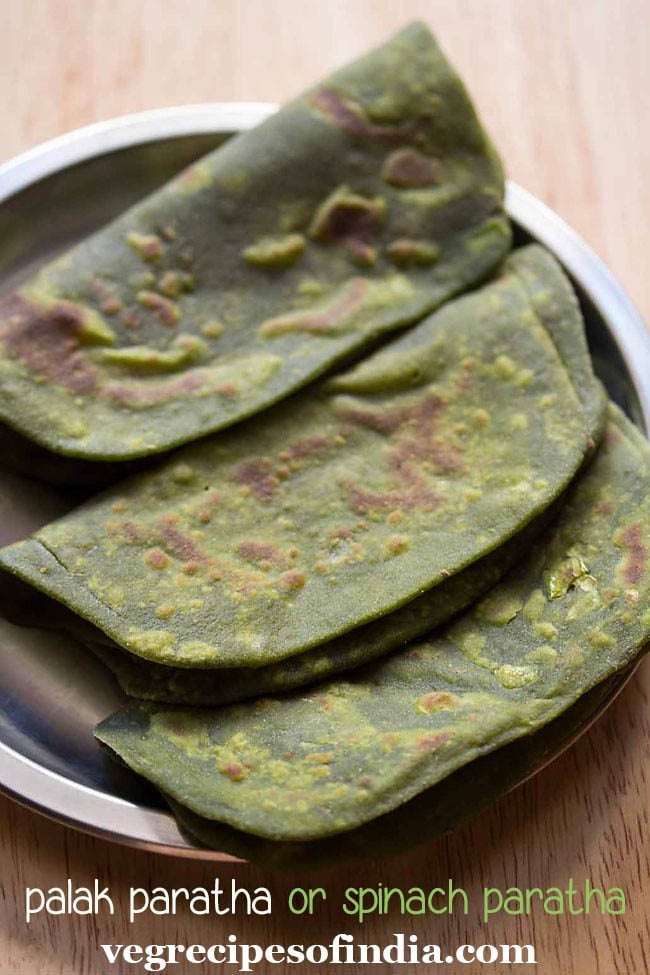
Expert Tips
- Cooking parathas: It is very important to roast the parathas on medium to high heat to achieve the best results. If you roast them on low heat they will become chewy and hard and if the heat is too high then the parathas will burn.
- Kneading: Make sure that the paratha dough is soft and smooth once you have finished kneading it. The dough should be relatively moist so if it is on the dry side then add a splash of water and knead it until you get the desired texture. Conversely, if the dough is too wet and sticky then add some wheat flour.
- Veggies: Feel free to add any pureed or grated veggies of your choice to this dish. For example, you can add mixed veggies, carrots, or pumpkins.
- Lunch box: If you want to add parathas to your lunch box then wrap them in foil tightly while they are still hot. You can also include mango pickle or lemon pickle as an accompaniment.
- Scaling: This recipe can be doubled or tripled if you need to feed a crowd.
FAQs
Paratha is a Hindi word which is a combination of the words parat (layers) and atta (whole wheat flour or dough). Thus in a simple English language the word Paratha refers to layers of the dough that have been cooked.
Yes, you can puree the palak, refrigerate it and freeze it for later. When most foods are in raw form or pureed they lose some nutrients.
However, all of the nutrients won’t be lost so the puree can still be used. But as a healthy practice always use the palak puree fresh.
Paratha is different from naan, roti, and chapati. While a plain paratha is served with accompaniments, stuffed paratha can be considered as a stand-alone dish.
Parathas are usually made with whole wheat flour, they are mostly round, pan-roasted, and are sometimes stuffed with veggies or paneer. Serve parathas with a host of accouterments.
Yes, you can add red spinach. In fact, you can add any greens of your choice to the parathas. You can either choose to puree them or finely chop. But do make a note of adding finely chopped fenugreek leaves and not its puree – as this would result in bitter tasting parathas.
To ensure that the parathas stay soft place them in a warm casserole as soon as you remove them from the tawa/skillet and cover the casserole.
If you want to add the parathas to a lunch box then remove the whole batch from the casserole while the parathas are still hot and pack them tightly in a foil.
Make sure that they don’t become cool while you are packing them in foil as this will make the parathas dense. In addition, using oil instead of ghee to cook parathas can help them to stay softer for longer.
More Delicious Paratha Varieties
North Indian Food Recipes
Breakfast Recipes
Breakfast Recipes
Breakfast Recipes
Please be sure to rate the recipe in the recipe card or leave a comment below if you have made it. For more vegetarian inspirations, Sign Up for my emails or follow me on Instagram, Youtube, Facebook, Pinterest or Twitter.
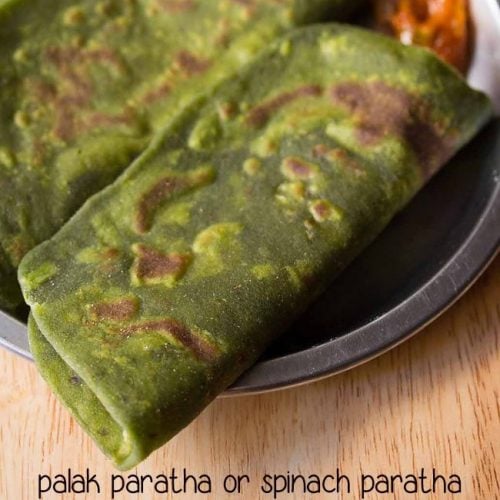
Palak Paratha Recipe (Indian Spinach Flatbread)
Ingredients
- 2 cups whole wheat flour
- 200 to 250 grams spinach or palak
- 1 or 2 green chilies, finely chopped – optional
- ¼ teaspoon carom seeds (ajwain)
- 2 teaspoon oil or ghee for kneading dough
- 4 teaspoon oil or ghee while folding the parathas
- 1 pinch asafoetida (hing) – optional
- salt as required
- oil or ghee (clarified butter) for roasting the paratha
Instructions
Making spinach puree
- Rinse the spinach leaves very well in water. Drain them.
- Heat enough water in a pan until it begins to bowl. Place the pan on your work surface. Add the spinach leaves in the hot water and blanch for 5 to 6 minutes.
- If you prefer you can strain and keep some of the stock in which we have boiled the spinach leaves for kneading the dough.
- Straining all the water take the blanched spinach leaves in a blender and puree them to a smooth consistency. Do not add any water while making the puree.
Kneading dough
- In a large bowl mix the whole wheat flour with salt, carom seeds, green chili and asafoetida (hing).
- Add the spinach puree and 2 tsp oil. Mix well.
- Add the required amount of stock or water in parts. Mix and knead to a smooth soft dough. The dough should not be sticky or dry. It should be soft and slightly moist.
Rolling palak paratha
- Take a medium size ball from the dough. Roll the dough ball into a small circle.
- Spread some oil or ghee on the top of the rolled dough. I have used ghee.
- Fold from both sides. Apply the oil or ghee on the folded side.
- Again fold from one side. You will get a square shape. roll into a medium-sized paratha.
Making palak ka paratha
- Place the paratha on a hot tava.
- Once you see some bubbles on the paratha and its 1/4th cooked, then flip it.
- Drizzle some oil or ghee on the top side. i used ghee to roast them.
- When the second side is half cooked then flip again.
- Again apply some oil or ghee on the top side (or second side).
- Press the paratha edges with the spatula or back of a spoon so that the paratha cooks evenly from all sides. You can flip a couple of times for even cooking.
- Cook them till they are crisp and brown from both sides.
- Make all paratha this way. While making second paratha wipe the skillet or tawa with a kitchen napkin, if there is any excess or extra whole wheat flour on it.
- Serve the palak paratha hot with yogurt or pickle. You can also stack them in a roti basket or casserole and serve them warm later or packed for tiffin box.
Notes
- The recipe can be doubled and tripled.
- You can use other greens to make this recipe instead of spinach leaves. Either chop them finely or grate them. If you are using fenugreek leaves then I recommend to finely chop them and not puree them as the puree can make your parathas taste bitter.
Nutrition Info (Approximate Values)
This Palak Paratha Recipe from the blog archives was first published on June 2013. It has been updated on December 2024.
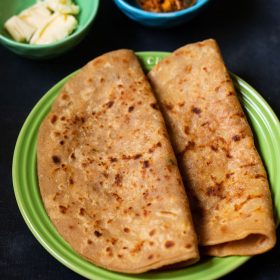
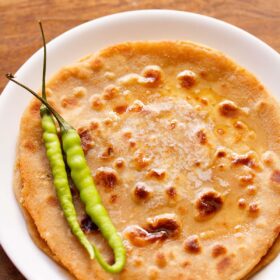
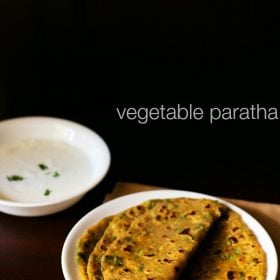
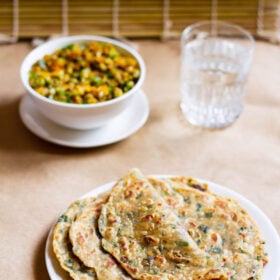
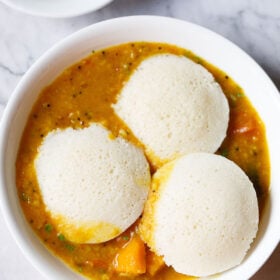
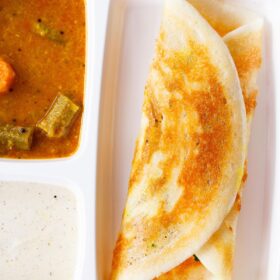
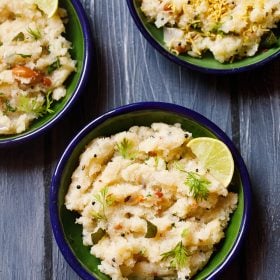








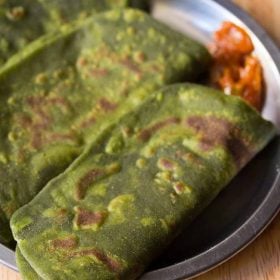
So well explained. Thank you
All questions answered
Welcome and thanks.
Hello,
Thank you for taking the time to prepare this excellent tutorial and share your expertise.
This is a great recipe – we made it today and our Palak Paratha’s turned out exactly as shown in your photo’s and tasted great.
Made these parathas just now.They turned out so yummy.Everybody loved it.Will definitely make it again.Thanks for sharing this simple and wonderful recipe.
thank you again winnie. tasty as well as healthy. welcome and happy cooking.
I tried this receipe today and it came out so well.Thank you very much!
Welcome Nivedita. Thanks for sharing your positive feedback on palak paratha
Loved it dassana ji. My school going 3 1/2 year old girl liked it a lot in her lunch box. Not only this.. every recipe you posted helped me a lot. Being a vegetarian I always look forward to ur recipes. Thanks and lots love. Good wishes
thank you swagatika. glad to know that your daughter liked the palak paratha. thanks for your best wishes too. happy cooking.
Tried this recipe today. Even without folding, its super soft and tasty!
Thanks for your detailed steps with pictures, amazing recipes.
Can I puree the palak and refrigerate it and use it as and when needed. Will it affect the nutritional value of the parathas? It will become very convinent if I blend palak for 2-3 days..
you can puree the palak and use it as needed. but freeze it. food especially in the raw form or pureed form does have a minor loss of nutrients when kept for long hours or days. but still overall the palak puree will have nutrients, so you can use it.
Loved the recipe and the detailed steps Dassana! Your website is invaluable – even made a cook out of an engineer 😉 I appreciate your detailed notes very much – I am here 4-5 times a week! May the universe bless you with continued grace and happiness.
thanks a lot varsha for your positive feedback and the best wishes. i am touched reading your kind words.
Very good,thanks.
welcome and thanks.
Hi. I wanted to clarify if palak puree should be mixed with wheat flour or stuffed after rolling. Also, how long the dough should rest. Thanks.
Welcome Archana. You can do both ways. Allow the dough to rest about 15 minutes.
Hey D , I have always loved parathas , but was never able to make them because of the complicated process of putting the filling in between and then rolling them flat . Your process is very simple and effective. Me and my 2 year old daughter loved these parathas?.
thanks again preethi. parathas are a staple at home. so i make then often. in fact i have added almost all the various paratha recipes on blog. this palak paratha is very easy. in fact you can even add some grated veggies like carrot, beetroot, zucchini, suran (elephant yam) and pumpkin. tastes very good. add your choice of spices.
Hi, my husband’s food habit is same like kids (tough for me )!! my husband don’t like green leafy vegetable, but he loves these paratha, want to know if I can replace spinach with red spinach in this recipe? Want to add more variety of veggie in his diet.
fine. you can add red spinach. in fact any greens can be used.
In picture Looks like u have chopped palak and mixed in the flour but in description u said it should be pureed and mixed..what I should do for best taste
the recipe was made by my mother in law. she pureed the blanched palak/spinach in a strainer and not in a blender. so the consistency was not very smooth. you can puree the palak also. both the methods taste good.